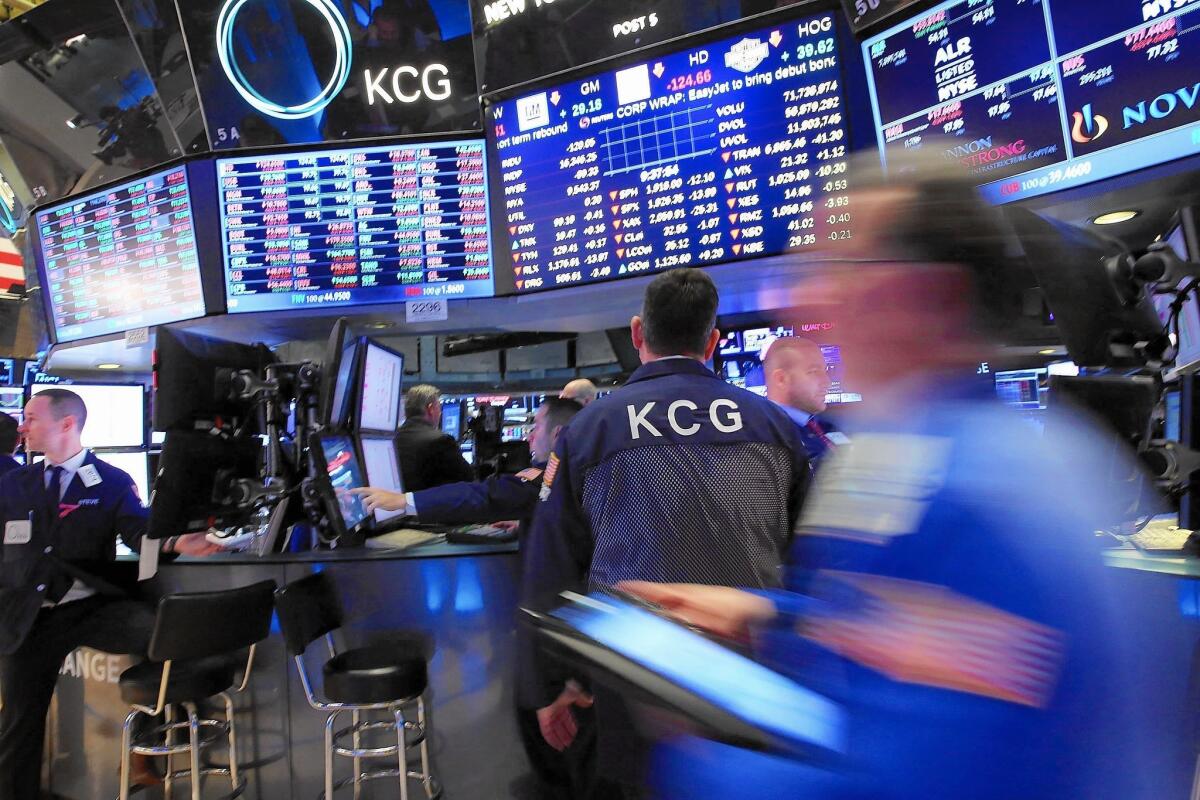Are tech stocks a bubble about to pop? So far, they’re defying predictions

The slide in tech stocks in the first six weeks of this year effectively put many of the stocks on sale, prompting some investors to buy them again and help the sector rebound. Above, the New York Stock Exchange floor Feb. 1.
Even in the volatile world of technology stocks, it was a stunning moment for investors.
Shares of the tech companies LinkedIn Corp. and Tableau Software Inc. dropped like an anvil from a cliff early this month after the firms reported disappointing growth forecasts. Their stocks plunged more than 40% in a single day and sparked a sell-off in other tech stocks as well.
“I don’t remember seeing a reaction as violent as that since the dot-com bubble burst” in 2000, said Pat O’Hare, chief market analyst at Briefing.com, an investment research site.
The sentiment among many investors and industry watchers was dire: A new tech bubble was on the brink of bursting, the days of sky-high valuations were over, rapid growth had stalled.
But anyone speculating that the latest sell-off meant the bubble had burst again for the tech sector had guessed wrong — at least for now.
Many technology shares shrugged off the LinkedIn-Tableau setback and have rebounded in the last two weeks. As a group, they’re still in the red so far this year but aren’t doing much worse than the stock market overall, which has had a rough start. Tech stocks also are holding up better than some other battered sectors, such as financial and healthcare stocks.
Although the benchmark Standard & Poor’s 500 index is down 6.2% this year, the S&P Information Technology index is off 7.1%.
The pullback includes the widely followed FANG stocks — Facebook Inc. (down 0.1% this year), Amazon.com Inc. (down 20.9%), Netflix Inc. (down 22%) and Google parent Alphabet Inc. (down 7.2%). Another tech leader, Apple Inc., is down 8.8%.
Tech stocks were one of the strongest sectors in 2015 as the overall market basically moved sideways. This year, as plunging oil prices and fears of slower economic growth worldwide pushed the overall market lower, tech stocks also were hit as many investors sold to take profits from the shares’ 2015 rally.
Despite the losses this year, Amazon.com is still up 41% over the last 12 months. Facebook is up 31.7% and Microsoft Corp. has a 19.1% gain.
Tech stocks by their nature often are volatile whether the companies are involved in hardware, apps, data storage or social media. In many cases the companies are relatively young with little or no earnings or they’re competing in fast-growing emerging markets.
Investors often are betting that the companies will enjoy rapid sales growth that eventually will produce sustained profits. But there’s tremendous risk because if there’s any sign that the growth will be less than expected, the stocks can suffer.
The slide in tech stocks in the first six weeks of this year effectively put many of the stocks on sale, prompting some professional money managers and other investors to buy them again and help the sector rebound.
In fact, analysts at S&P Global Market Intelligence recently raised their rating on tech stocks partly due to “attractive valuations” and because they believe Wall Street’s estimates for many of the companies’ earnings growth this year “are overly pessimistic.”
The headlines generated by the shortfalls at LinkedIn, Tableau Software and other firms also “resulted in the investing public becoming overly negative on the technology sector,” said Scott Kessler, a tech analyst at S&P Global Market Intelligence.
Still, investors are being very selective about which tech stocks they buy this time around. The stocks “are cheaper but I wouldn’t call them cheap,” said Deborah Koch, co-manager of the Northern Trust Technology Fund.
Many tech stocks are still struggling to climb back to their once lofty levels. For example, chipmaker Intel Corp. is still down 16.7% this year, activity tracker Fitbit Inc. is down a whopping 47.3% this year and cybersecurity firm FireEye Inc. has dropped 33%.
“I don’t think we’re seeing a mass bubble popping in the technology sector,” O’Hare said. “You are seeing targeted popping of some high [price-to-earnings] multiple stocks that was probably overdue.
“This market no longer is willing to pay for growth at any price,” he said. “People are trying to search for bargains but also they want quality growth.”
Much of the tech sector concern over the last few weeks stems from weaker economic growth worldwide, which means less corporate spending for information-technology goods and services.
“There is no question there has been a downtick in global IT spending,” Koch said. “Tech is very sensitive to economic growth.”
Among the hardest hit: The stock market’s newest — and thus most unproven — companies. Many of the firms that had their initial public offerings last year are now trading below their IPO prices, including Fitbit, Columbia Pipeline Group Inc. and payment-processing firm First Data Corp.
The U.S. dollar’s strength also has been a head wind for many tech companies because their overseas sales in foreign currencies convert to fewer dollars, O’Hare said.
That has led many investors to focus on the “legacy” tech stocks such as Facebook, Alphabet and Apple that have solid histories of sales and earnings growth.
“We’ve leaned a bit more into legacy companies,” Koch said. “They have much more reasonable valuations” relative to their growth prospects, she said.
But not every investor is preoccupied by the current volatility in tech stocks.
Gavin Baker, manager of Fidelity Investments’ OTC Portfolio Fund, said he maintains a long-term focus on “investing in great companies that are at the center of multi-decade trends.”
Although concerns about world economies, oil prices and China are weighing on stocks today, Baker said, “I don’t expect that to have any impact on the five- or 10-year outlook for e-commerce, Internet advertising or solar power.”
Twitter: @PeltzLATimes
Twitter: @peard33







